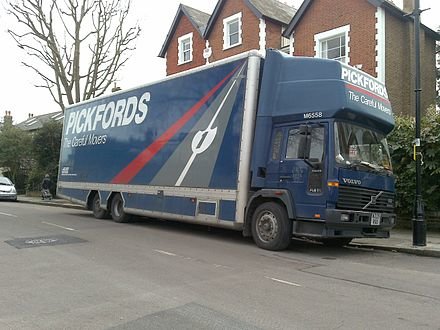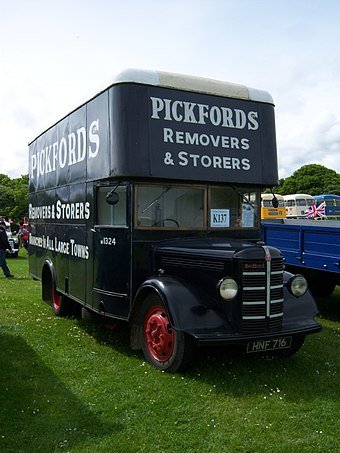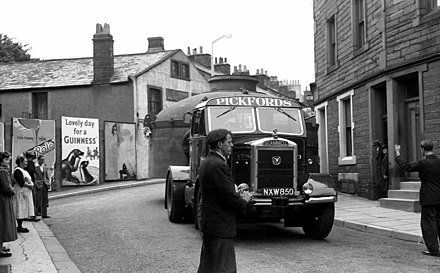British Heritage
Remember, Cherish, Learn.
beta
Pickfords - the First-ever Moving Company (1646)
A Legacy of Innovation and Service in British Heritage.
Few companies have maintained a profound influence on the very fabric of a nation's economic and social heritage for several centuries. Such a distinctive accolade belongs to Pickfords, the earliest known moving company in the United Kingdom and the world. With roots tracing back to 1646, Pickfords has remained an integral part of Britain's entrepreneurial landscape, contributing to its infrastructure, law, and industry development while evolving with the country's shifting societal needs.
Pickfords' history commences with its founding during the tumultuous period of the English Civil War. Born from the entrepreneurial spirit of a north-country yeoman, Thomas Pickford, the business primarily facilitated the transportation of quarry stone by pack-horse, pivoting to haul goods during return trips.
The 18th century marked significant milestones for the company. In 1756, a strategic relocation to London expanded Pickfords' operations, while 1776 saw the invention of the fly wagon—a fast transport method that considerably reduced the travel time between London and Manchester.
These pioneering steps bolstered Pickfords' growth, even leading to its entrance into the canal industry in 1779. It also expanded into railway wagon operations during the 19th century, a venture that eventually proved contentious and was ultimately terminated.
In 1816, despite its relative success, Pickfords faced the grim prospect of bankruptcy. The company was sold to a group of investors led by Joseph Baxendale, thus marking the end of the Pickford family's direct involvement. However, this change initiated over a century of Baxendale family stewardship.
An unfortunate late delivery in 1848 led to Pickfords' involvement in the landmark English contract law case, Hadley v. Baxendale. The court ruled that the company was not liable for unforeseeable losses resulting from lateness, establishing a fundamental principle of contract law that still guides business agreements today.
The 20th century marked significant transformations for Pickfords. The company transitioned from canal and rail transport to road haulage, a move that intensified its rivalry with fellow haulier, Carter Paterson. This competitive landscape resulted in a merger in 1912, although both companies retained their separate identities.
Subsequent ownership changes saw Pickfords sold to Hay's Wharf Cartage Company in 1920, then to British Road Services in 1947, and later became part of the National Freight Corporation (NFC) in 1969. Despite these transitions, Pickfords maintained its brand name, testifying to its enduring legacy.
Pickfords' contribution to British heritage is not merely commercial; its involvement in significant national projects underscores its pivotal role in the nation's history. During World War II, the company's heavy haulage division facilitated the movement of Mulberry harbour sections—temporary harbours crucial to the success of the Normandy landings.
Throughout the 1950s to the 1980s, Pickfords, under the umbrella of the NFC, expanded into heavy haulage, absorbing several renowned haulage companies and gaining prominence in moving oversized loads. Though the company later withdrew from this sector, several preserved Pickfords vehicles now serve as reminders of this vibrant era at various events and exhibitions.
The 1980s and 1990s were marked by diversification and international expansion. Pickfords' travel agency became the second-largest in the UK in 1984, encompassing its own brand and the Harry Leek chain. Further acquisitions followed, leading to the formation of Going Places post-Airtours' purchase in 1992.
Pickfords' reach extended globally following its sale to the American company Allied Van Lines in 1996. The international branch, renamed Allied Pickfords, emerged as a global moving giant with 600 offices in over 45 countries, while the UK branch continued to operate as Pickfords.
Despite its global success, Pickfords faced challenges in the 21st century, including a pre-packaged insolvency in 2012. Fortunately, two of its directors purchased the UK arm, securing employment for the company's 900 staff members.
Demonstrating a commitment to corporate responsibility, Pickfords announced a partnership with the NSPCC in 2010, further solidifying its integral role in the UK's societal fabric.
Pickfords is an extraordinary testament to resilience and adaptability. From its origins in the 17th century to its modern incarnation as a global moving giant, the company has navigated societal changes, legal challenges, and business adaptations. Its storied past is not only part of British heritage; it also serves as a model for enterprises worldwide. Through economic downturns, wars, and industrial revolutions, Pickfords has continued to serve, move, and evolve—a testament to its enduring legacy in the annals of British business history.
A Storied History: From Humble Beginnings to an International Network
Pickfords' history commences with its founding during the tumultuous period of the English Civil War. Born from the entrepreneurial spirit of a north-country yeoman, Thomas Pickford, the business primarily facilitated the transportation of quarry stone by pack-horse, pivoting to haul goods during return trips.
The 18th century marked significant milestones for the company. In 1756, a strategic relocation to London expanded Pickfords' operations, while 1776 saw the invention of the fly wagon—a fast transport method that considerably reduced the travel time between London and Manchester.
These pioneering steps bolstered Pickfords' growth, even leading to its entrance into the canal industry in 1779. It also expanded into railway wagon operations during the 19th century, a venture that eventually proved contentious and was ultimately terminated.
Challenges, Changes, and Legal Precedence
In 1816, despite its relative success, Pickfords faced the grim prospect of bankruptcy. The company was sold to a group of investors led by Joseph Baxendale, thus marking the end of the Pickford family's direct involvement. However, this change initiated over a century of Baxendale family stewardship.
An unfortunate late delivery in 1848 led to Pickfords' involvement in the landmark English contract law case, Hadley v. Baxendale. The court ruled that the company was not liable for unforeseeable losses resulting from lateness, establishing a fundamental principle of contract law that still guides business agreements today.
The Evolution of Services and Ownership
The 20th century marked significant transformations for Pickfords. The company transitioned from canal and rail transport to road haulage, a move that intensified its rivalry with fellow haulier, Carter Paterson. This competitive landscape resulted in a merger in 1912, although both companies retained their separate identities.
Subsequent ownership changes saw Pickfords sold to Hay's Wharf Cartage Company in 1920, then to British Road Services in 1947, and later became part of the National Freight Corporation (NFC) in 1969. Despite these transitions, Pickfords maintained its brand name, testifying to its enduring legacy.
Key Contributions to British Infrastructure and Industry
Pickfords' contribution to British heritage is not merely commercial; its involvement in significant national projects underscores its pivotal role in the nation's history. During World War II, the company's heavy haulage division facilitated the movement of Mulberry harbour sections—temporary harbours crucial to the success of the Normandy landings.
Throughout the 1950s to the 1980s, Pickfords, under the umbrella of the NFC, expanded into heavy haulage, absorbing several renowned haulage companies and gaining prominence in moving oversized loads. Though the company later withdrew from this sector, several preserved Pickfords vehicles now serve as reminders of this vibrant era at various events and exhibitions.
Diversification and Global Expansion
The 1980s and 1990s were marked by diversification and international expansion. Pickfords' travel agency became the second-largest in the UK in 1984, encompassing its own brand and the Harry Leek chain. Further acquisitions followed, leading to the formation of Going Places post-Airtours' purchase in 1992.
Pickfords' reach extended globally following its sale to the American company Allied Van Lines in 1996. The international branch, renamed Allied Pickfords, emerged as a global moving giant with 600 offices in over 45 countries, while the UK branch continued to operate as Pickfords.
Challenges and Corporate Responsibility
Despite its global success, Pickfords faced challenges in the 21st century, including a pre-packaged insolvency in 2012. Fortunately, two of its directors purchased the UK arm, securing employment for the company's 900 staff members.
Demonstrating a commitment to corporate responsibility, Pickfords announced a partnership with the NSPCC in 2010, further solidifying its integral role in the UK's societal fabric.
Conclusion: A Pillar of British Heritage
Pickfords is an extraordinary testament to resilience and adaptability. From its origins in the 17th century to its modern incarnation as a global moving giant, the company has navigated societal changes, legal challenges, and business adaptations. Its storied past is not only part of British heritage; it also serves as a model for enterprises worldwide. Through economic downturns, wars, and industrial revolutions, Pickfords has continued to serve, move, and evolve—a testament to its enduring legacy in the annals of British business history.
- Pickfordsen.wikipedia.org









